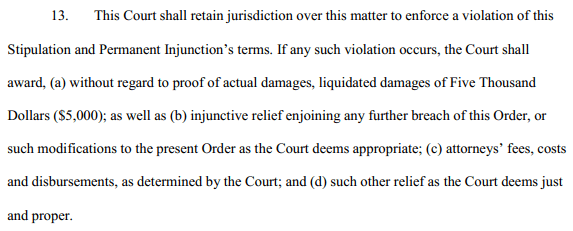Google Says It Can’t Filter Pirated Content Proactively
samedi 2 décembre 2017 à 21:44 Over the past few years the entertainment industries have repeatedly asked Google to step up its game when it comes to its anti-piracy efforts.
Over the past few years the entertainment industries have repeatedly asked Google to step up its game when it comes to its anti-piracy efforts.
These calls haven’t fallen on deaf ears and Google has steadily implemented various anti-piracy measures in response.
Still, that is not enough. At least, according to several prominent music industry groups who are advocating a ‘Take Down, Stay Down’ approach.
Currently, Google mostly responds to takedown requests that are sent in by copyright holders. The search engine deletes the infringing results and demotes the domains of frequent infringers. However, the same content often reappears on other sites, or in another location on the same site.
Earlier this year a group of prominent music groups stated that the present situation forces rightsholders to participate in a never-ending game of whack-a-mole which doesn’t fix the underlying problem. Instead, it results in a “frustrating, burdensome and ultimately ineffective takedown process.”
While Google understands the rationale behind the complaints, the company doesn’t believe in a more proactive solution. This was reiterated by Matt Brittin, President of EMEA Business & Operations at Google, during the Royal Television Society Event in London this week.
“The music industry has been quite tough with us on this. They’d like us proactively to know this stuff. It’s just not possible in this industry,” Brittin said.
That doesn’t mean that Google is sitting still. Brittin stresses that the company has invested millions in anti-piracy tools. That said, there can always be room for improvement.
“What we’ve tried to do is build tools that allow them to do that at scale easily and that work all together … I’m sure there are places where we could do better. There are teams and millions of dollars invested in this.
“Combatting bad acts and piracy is obviously very important to us,” Brittin added.
While Google sees no room for proactive filtering in search results, music industry insiders believe it’s possible.
Ideally, they want some type of automated algorithm or technology that removes infringing results without a targeted DMCA notice. This could be similar to YouTube’s Content-ID system, or the hash filtering mechanisms Google Drive employs, for example.
For now, however, there’s no sign that Google will go beyond the current takedown notice approach, at least for search. A ‘Take Down, Stay Down’ mechanism wouldn’t “understand” when content is authorized or not, the company previously noted.
And so, the status quo is likely to remain, at least for now.
Source: TF, for the latest info on copyright, file-sharing, torrent sites and more. We also have VPN discounts, offers and coupons


 Frustrated by thousands of cheaters who wreak havoc in Fortnite’s “Battle Royale,” game publisher Epic Games decided to take several of them to court.
Frustrated by thousands of cheaters who wreak havoc in Fortnite’s “Battle Royale,” game publisher Epic Games decided to take several of them to court.

 The European Commission has had copyright issues at the top of its agenda for a while, resulting in several
The European Commission has had copyright issues at the top of its agenda for a while, resulting in several